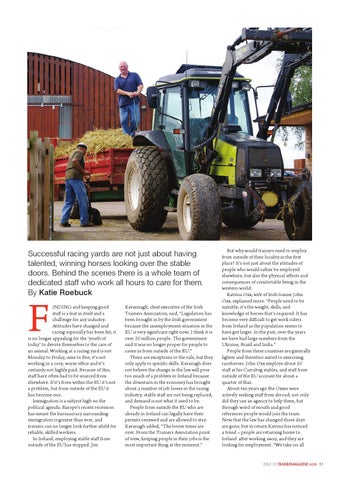EMPLOYMENT ISSUE 30.qxd:Jerkins feature.qxd
20/5/10
18:51
Page 2
EMPLOYMENT
Successful racing yards are not just about having talented, winning horses looking over the stable doors. Behind the scenes there is a whole team of dedicated staff who work all hours to care for them. By Katie Roebuck
F
INDING and keeping good staff is a feat in itself and a challenge for any industry. Attitudes have changed and racing especially has been hit; it is no longer appealing for the ‘youth of today’ to devote themselves to the care of an animal. Working at a racing yard is not Monday to Friday, nine to five; it’s not working in a cosy, warm office and it’s certainly not highly paid. Because of this, staff have often had to be sourced from elsewhere. If it’s from within the EU it’s not a problem, but from outside of the EU it has become one. Immigration is a subject high on the political agenda. Europe’s recent recession has meant the bureaucracy surrounding immigration is greater than ever, and trainers can no longer look further afield for reliable, skilled workers. In Ireland, employing stable staff from outside of the EU has stopped. Jim
Kavannagh, chief executive of the Irish Trainers Association, said, “Legislation has been brought in by the Irish government because the unemployment situation in the EU is very significant right now; I think it is over 20 million people. The government said it was no longer proper for people to come in from outside of the EU.” There are exceptions to the rule, but they only apply to specific skills. Kavanagh does not believe the change in the law will pose too much of a problem in Ireland because the downturn in the economy has brought about a number of job losses in the racing industry, stable staff are not being replaced, and demand is not what it used to be. People from outside the EU who are already in Ireland can legally have their permits renewed and are allowed to stay. Kavanagh added, “The boom times are over. From the Trainers Association point of view, keeping people in their jobs is the most important thing at the moment.”
But why would trainers need to employ from outside of their locality in the first place? It’s not just about the attitudes of people who would rather be employed elsewhere, but also the physical effects and consequences of comfortable living in the western world. Katrina Oxx, wife of Irish trainer John Oxx, explained more. “People need to be suitable; it’s the weight, skills, and knowledge of horses that’s required. It has become very difficult to get work riders from Ireland as the population seems to have got larger. In the past, over the years we have had large numbers from the Ukraine, Brazil and India.” People from these countries are generally lighter and therefore suited to exercising racehorses. John Oxx employs about 50 staff at his Currabeg stables, and staff from outside of the EU account for about a quarter of that. About ten years ago the Oxxes were actively seeking staff from abroad; not only did they use an agency to help them, but through word of mouth and good references people would join the team. Now that the law has changed those days are gone, but in return Katrina has noticed a trend – people are returning home to Ireland after working away, and they are looking for employment. “We take on all
ISSUE 30 TRAINERMAGAZINE.com 51
